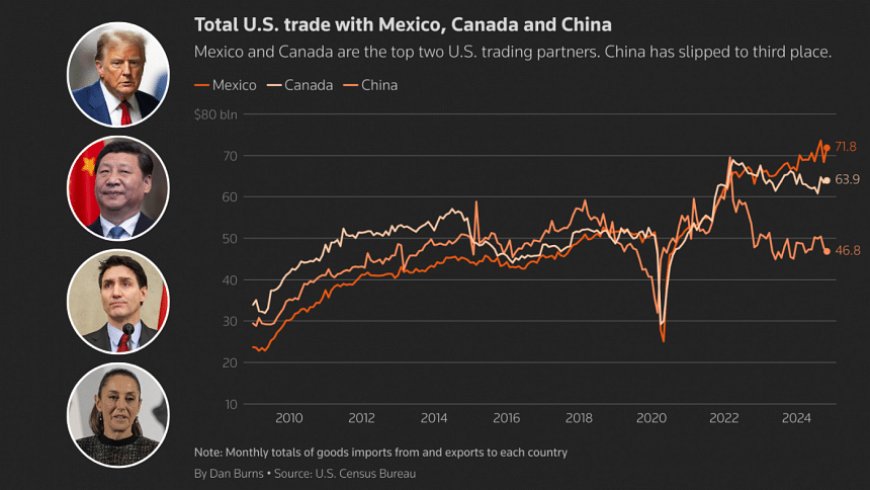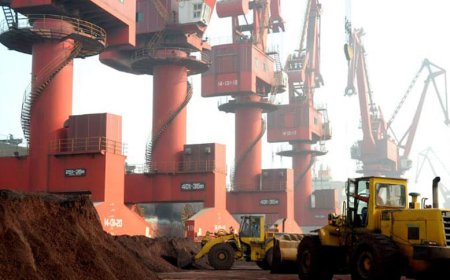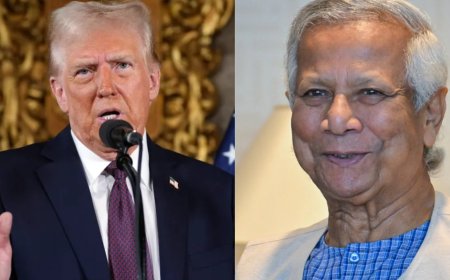Trump initiates a trade war by imposing tariffs on Mexico, Canada, and China
On Saturday, U.S. President Donald Trump imposed broad tariffs on imports from Mexico, Canada, and China, urging them to curb the flow of fentanyl—and, in the case of Mexico and Canada, illegal immigration—into the United States. The move ignited a trade war that could slow global growth and drive inflation higher.

Mexico and Canada, the United States' top trading partners, swiftly vowed to impose retaliatory tariffs, while China announced plans to challenge Trump's decision at the World Trade Organization and implement unspecified countermeasures.
Through three executive orders, Trump enacted 25% tariffs on Mexican and most Canadian imports and 10% on Chinese goods, effective Tuesday. He stated the tariffs would remain in place until the "national emergency" over fentanyl and illegal immigration was resolved, but the White House provided no clear criteria for lifting the measures. In response to concerns from oil refiners and Midwestern states, Trump set a lower 10% duty on Canadian energy imports, while Mexican energy products faced the full 25% tariff.
Canadian Prime Minister Justin Trudeau announced retaliatory 25% tariffs on $155 billion worth of U.S. goods, including beer, wine, lumber, and appliances. The first $30 billion would take effect Tuesday, with the remaining $125 billion following in 21 days. Trudeau warned that the tariffs would drive up prices for U.S. consumers on essentials like groceries and gasoline, potentially leading to auto plant closures and supply chain disruptions for critical materials such as nickel, potash, uranium, steel, and aluminum. He also encouraged Canadians to avoid travel to the U.S. and boycott American products.
Mexican President Claudia Sheinbaum, in a post on X, stated that she had instructed her economy minister to implement retaliatory tariffs, though she did not provide details. Both Canada and Mexico signaled their intent to coordinate their response to Trump's trade measures. Meanwhile, China's Commerce Ministry refrained from specifying its countermeasures but left the door open for negotiations with Washington.
A White House fact sheet indicated the tariffs would remain in place "until the crisis alleviated" but did not outline specific actions required for their removal. In 2023, crude oil imports from Canada accounted for about a quarter of total U.S. imports from the country, according to U.S. Census Bureau data. The new tariffs are expected to hit the auto industry particularly hard, as vehicles and parts frequently cross North American borders multiple times before final assembly.
Trump's announcement follows his repeated threats during the 2024 presidential campaign and since taking office, defying warnings from economists that escalating trade conflicts with key partners would slow both U.S. and global economic growth while increasing consumer costs. Republican lawmakers welcomed the move, while Democrats and industry leaders warned of inflationary pressures.
Jake Colvin, president of the National Foreign Trade Council, cautioned that the tariffs would raise prices on "everything from avocados to automobiles" and urged the U.S., Canada, and Mexico to find a swift resolution to prevent further escalation. Canadian business leaders and provincial officials expressed outrage, with some calling for aggressive countermeasures against U.S. imports.
In an immediate sign of backlash, American national anthem was booed in Ottawa before an NHL game between the Ottawa Senators and Minnesota Wild, just 90 minutes after Trump’s announcement. The Senators went on to win 6-0.
According to Trump’s executive order, U.S. tariff collections will begin at 12:01 a.m. EST (0501 GMT) on Tuesday. However, goods already in transit before 12:01 a.m. Saturday will be exempt. Trump invoked the International Emergency Economic Powers Act and the National Emergencies Act to justify the tariffs, granting himself broad authority to impose sanctions in response to crises.
Legal experts noted that Trump was once again testing the limits of executive power, and the tariffs could face legal challenges. Democratic lawmakers Suzan DelBene and Don Beyer condemned the move as "a blatant abuse of executive power."
White House officials confirmed that there would be no exemptions from the tariffs and warned that any retaliation by Canada, Mexico, or China could lead to even higher duties. In response, Nova Scotia Premier Tim Houston ordered all U.S. alcohol products to be removed from the province’s store shelves.
Additionally, the White House announced that Canada would no longer qualify for the U.S. "de minimis" duty exemption for shipments under $800. Officials argued that Canada and Mexico have become transit points for fentanyl and precursor chemicals entering the U.S. through small packages that often evade customs inspections.
LONG-PROMISED TARIFFS
Trump acknowledged on Friday that the tariffs could cause economic disruptions and hardships for Americans. He also hinted at additional tariffs targeting steel, aluminum, semiconductor chips, and pharmaceuticals. However, he did not address the media following the official announcement.
The policy was spearheaded by Deputy Chief of Staff Stephen Miller, a longtime hardliner on immigration, and Trump’s nominee for Commerce Secretary, Howard Lutnick, who traveled with the president to Florida on Friday.
Less than two weeks into his second term, Trump is already reshaping U.S. economic policy and global trade relationships.
Economic models from EY Chief Economist Greg Daco project that Trump's tariffs could shrink U.S. GDP by 1.5 percentage points in 2025, push Canada and Mexico into recession, and trigger "stagflation" in the U.S. Daco warned that the tariffs could cause a "stagflationary shock"—a mix of economic slowdown and rising inflation—while increasing financial market volatility.
Markets reacted sharply to the news, with the Mexican peso and Canadian dollar falling after Trump’s announcement. U.S. stock prices also dropped, and Treasury bond yields rose.
What's Your Reaction?




















































































